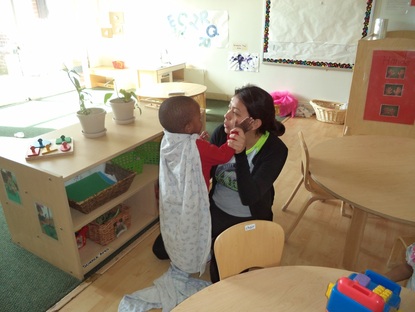 By Elia Rocha I don’t mean to state the obvious, but we’re all egocentric. That’s not a judgment. I think that by and large, we’re all hard-wired to filter information and external stimuli through the prism of our needs and experiences. This leads me to another possibly obvious point, which is that having empathy is a skill which takes practice to hone. More than most professions, I believe that being in the child development field requires an uncommonly high level of deliberation in thought and deed. Teachers are constantly and critically reassessing their understanding of children’s behavior, as well as their own motivations. In other words, they are practicing empathy, putting themselves in the shoes of the children they care for and teach, to see beyond their behavior to the need they are trying to communicate. There is a little girl in the preschool classroom at Play House West. She is like a constantly revving engine, ready to react to any and all circumstances in a heightened manner. Waiting a turn, or sitting still during story time can be especially hard. Her primary caregiver is attuned to her cues and when it looks like her anxiety is escalating and her impulse control is diminishing, she knows its time to help this little girl calm her body down. What she, or another teacher will do, is take her for a walk and give her bubbles to blow. The walk removes her from the fraught environment, and the bubbles regulate her breathing, allowing her the time to calm down and rejoin her classmates. This approach takes the need the child is trying to communicate (I need help calming down) as paramount, instead of merely assessing the behavior as disruptive, and trying to control it. The fact is that by taking this little girl for a walk and giving her bubbles to blow, they are showing her how she can regain control when she is feeling stress. She now tells her teachers when she needs her bubbles. There are many other strategies that teachers use to help the children in their care feel safe and successful. What works for this child may not work for another. And, that’s the point. The deep, and thoughtful empathy the teachers practice means that every child is seen, approached, and cared for as an individual. Comments are closed.
|
AuthorVarious members of the Children Today staff contribute to these blog posts. Archives
July 2024
Categories |
